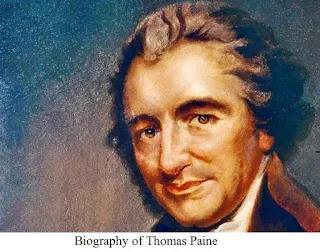Biography of Thomas Paine:
Thomas Paine (1737-1809) was a political activist, philosopher, and Founding Father of the United States. Born in Thetford, Norfolk, England, Paine became a key figure in the American and French Revolutions. His influential writings played a crucial role in shaping the political ideology of the time.
 |
| Biography of Thomas Paine |
Early Life:
1. Background: Thomas Paine was born on January 29, 1737, in Thetford, England, to a Quaker family.
2. Apprenticeship and Seafaring: He initially worked as an apprentice to his father in corset making but later became a sailor, spending time in England and America.
Thomas Paine's Move to America:
1. Arrival in Philadelphia: Paine immigrated to Philadelphia in 1774, seeking a fresh start and influenced by Benjamin Franklin's suggestion.
2. "Common Sense" (1776): Paine's most famous work, "Common Sense," was published in 1776. It argued for American independence from British rule and became immensely popular, helping to galvanize public support for the revolutionary cause.
American Revolution:
1. Role in the Continental Army: Paine served as a secretary to the Congressional Committee on Foreign Affairs and later as a soldier in the Continental Army.
2. "The American Crisis" Series: During the difficult times of the American Revolution, Paine wrote a series of pamphlets known as "The American Crisis." The first of these began with the famous line, "These are the times that try men's souls."
Post-Revolutionary Period:
1. Controversies and Criticisms: Paine's advocacy for more radical ideas, including social reforms, and his criticisms of organized religion led to controversies. His work "The Age of Reason" (1794) challenged traditional Christian beliefs and faced strong opposition.
2. Return to Europe: After the American Revolution, Paine returned to Europe. He was involved in the French Revolution, writing "Rights of Man" (1791-1792), which defended the principles of the French Revolution.
Later Years and Legacy of Thomas Paine:
1. Imprisonment in France: Paine's support for a constitutional monarchy in France led to his arrest during the Reign of Terror. He narrowly escaped execution but spent ten months in prison.
2. Marginalization in the U.S.: Paine's radical views and criticisms of prominent figures, including George Washington, led to his marginalization in the United States.
3. Death and Burial: Thomas Paine died in New York City on June 8, 1809, at the age of 72. Due to his controversial beliefs, only a handful of people attended his funeral.
4. Legacy: Despite facing challenges and controversy in his later years, Thomas Paine's writings, particularly "Common Sense," continue to be celebrated for their role in inspiring revolutionary thought and advocating for democratic principles.
Thomas Paine's ideas on democracy, human rights, and social justice left a lasting impact on both the American and French Revolutions. His work laid the groundwork for the development of democratic societies and the protection of individual freedoms.